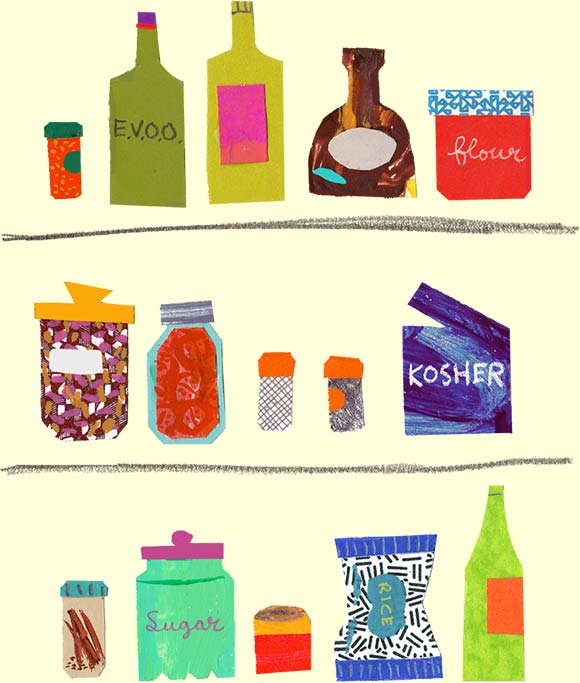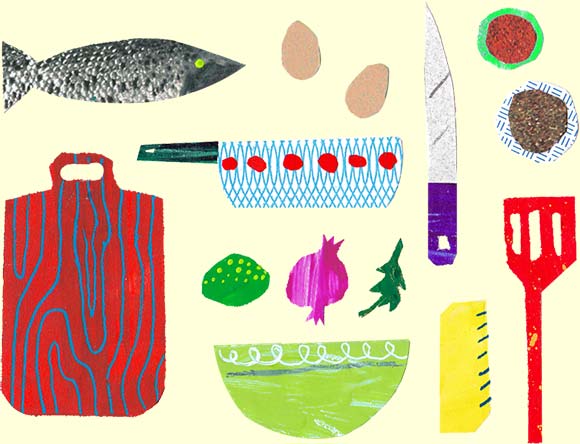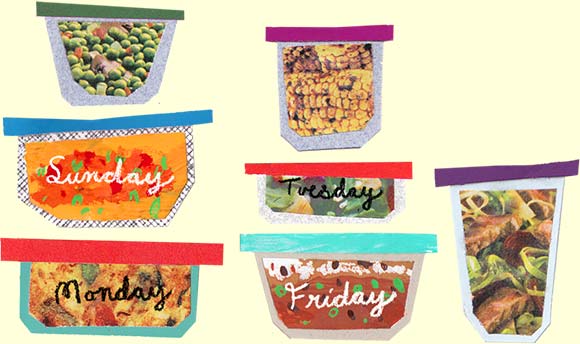I want you to cook dinner.
Now, this sounds like a fairly reasonable request, especially as we are in the midst of a cooking renaissance. Cooking and food are cool. We lionize chefs, seek out exotic eateries, and elbow our way through farmers markets to eat seasonally.
San Francisco, where I live, prides itself on being really into food. We know where our food comes from, and I don’t just mean that it’s organic: we know which farm, on which hillside, and what time of day that Meyer lemon was plucked. The only thing everyone talks about more than the skyrocketing rent is food. But most San Franciscans might be surprised to learn we don’t have a monopoly on foodie-ism — that, in fact, Instagramming steaming bowls of ramen is a worldwide phenomenon.
Despite our collective yearning for good food, I have this suspicion that not everyone cooks. Or at least not everyone cooks as much as they would like or, dare I suggest, as much as they should.
See if this sounds familiar:
You worked later than you wanted to — again — so you had to go to the seven o’clock Pilates class, and now you’re standing in front of the prepared foods counter at your local fancy grocery, trying to decide between quinoa with beets or kale salad.
Or, your friends are all Snapchatting you from the latest pop-up barbecue joint in town, and even though you ate out the last four nights, you can’t resist. And besides, the only thing you have at home is a fridge full of craft beer, artisanal mayonnaise, and imported mustards.
Or, it’s only the middle of the week, work has been hell, you’ve got to run errands all over town, grab the kids from school, and the last thing you want to think about is what’s for dinner.
With so many reasons to skip cooking, especially in the bountiful time in which we live, let me suggest it’s actually punk rock to go home and cook dinner every night, whether it’s just for yourself, your roommate, your partner, or your nuclear family of four.
A few years ago, a Harvard primatologist wrote a fascinating book called Catching Fire, about how cooking was crucial to human evolution — how our ancient ancestors firing up that prehistoric barbecue and cooking meat allowed us to create civilization. We are human, essentially, because we learned to cook.
Even if you don’t care about human evolution and are just biding your time until the post-human singularity, cooking is important in the here and now. How many hours a day do you sit in front of a keyboard and screen? When you cook, it gives you something to do with your hands that doesn’t involve a smartphone. When you cook, it gets you away from your computer and hyperconnectedness, if just for a moment, and forces you to do something primal, something humans have done for eons. And when you switch modes like that, when you disconnect even for twenty minutes, it gives your brain some room to think. You might be standing there chopping onions, but your brain is approaching a problem from work in a way you wouldn’t let it while hunched over a computer.
Cooking is important — it’s fundamental to who we are. So, I’d like to offer some strategies about becoming a more dedicated cook.
Stock your larder
First things first: stock your larder. Larder is one of those delightful, anachronistic terms that just means your pantry, fridge, or freezer. The idea here is to have the staples on hand so when you do get home, you can still throw something together with a little creativity.
What are these staples? Yours will evolve, but let me suggest starting with:

- Olive oil
- Canola oil
- Balsamic vinegar
- Champagne vinegar
- Kosher salt
- Fresh pepper
- Paprika
- Curry powder
- Cinnamon
- Sugar
- All-purpose flour
- Rice
- Dried beans
- Canned tomatoes
- Mustard
- Soy sauce
- Honey
- Baking soda
- Baking powder
- Garlic
- Onion
- Eggs
- A lemon
This isn’t exhaustive, and you don’t need to rush out and buy everything at once, but try to make it a goal to have most of this on hand.
Practice your “meez”
The French, they have a word for everything! Including a wonderful phrase you’ll hear in professional kitchens, mise en place (pronounced “meez on plas”), which just means “to put in place.” And while this sounds simple, it’s so much more than that: it’s the Zen of the kitchen — it’s how a cook thinks and acts and feels while cooking.
In a very literal sense, mise en place is all about setting up to cook. It’s reading the recipe all the way through, and assembling your ingredients and utensils before you start cooking. It’s making sure you have everything you need at hand, so there’s not some mad dash around the kitchen between steps.
I like to think of your “meez” as also how you, personally, approach your craft. Cooking is many things, but it’s also work: it requires focus, and good cooks respect this, respect the craft, and make the act of simply preparing dinner personal to them.
Learn to use salt & fat
Salt and fat: the two most maligned and misunderstood ingredients in the American diet.
I have this theory about how home cooks use — or rather, misuse — salt and fat. Because we’re constantly being told conflicting stories about whether salt and fat are at the root of so many health problems, we’re afraid of them. We don’t cook with them and, when we do, we guiltily and sparingly sprinkle just enough around the edges.
Consequently, our home-cooked food tastes bland. You know why restaurant food tastes so good? Because it’s full of salt and fat! You don’t need Michael Pollan to tell you why processed foods hit all of those triggers in your lizard brain — they’re full of chemical stand-ins for salt and fat (and sugar).
Now, I’m not advocating larding up every dish with a stick of butter and a handful of salt before you deep-fry it, Paula Deen style. What I am saying is, stop being afraid of the right amounts of salt and fat.
The reason that processed foods out of a can or a box have so much sodium is because they are made with the most bland ingredients and chemicals that need all that salt to approximate food. Start with real food — fresh leeks from the farmers market or a wonderful pork shoulder from the butcher — and a little salt helps accentuate the flavors. I promise you, there is no amount of salt you can add to any dish you cook — and have it still be edible — that will match the amount of sodium in a processed microwave dinner.
Using real butter or real olive oil is not going to spontaneously clog an artery. Your food should be flavorful, it should be balanced, it should be something you want to eat, and you can do all of that with a pinch or two of salt, and honest-to-god fat, and still make food that’s vastly better than what the industrial food complex out there is assembling.
Gear up, not too much, mostly steel
I was living in Chicago when I got my first real job. My drafty one-bedroom was $700 a month. For the first time in my life, I had a little of my own money, so what was one of the first things I bought? A nine-piece Wüsthof knife set. It came with a chef’s knife, a slicing knife, a paring knife, a straight paring knife, a utility knife, a bread knife, a set of shears, a honing steel, and a big wooden block to hold it all. Cost me half a month’s rent.

I still have that knife set, but do you know how many of those knives I use? Two, three — at most — and I lost at least one of the paring knives and replaced the block with a magnetic wall mount.
I know for a lot of us — and I’m just as guilty of this as anyone — the gear is as much a part of the experience as the food. But don’t fetishize it. Let’s commit to buying fewer but better things. Let’s promise to avoid single-use “gadgets” — no one needs a mango pitter, an egg slicer, an epicurean pizza cutter, a bagel slicer, a garlic peeler, or really half the shit in your neighborhood Sur la Table. A 12″ skillet, sharp knife, a few mixing bowls, and a spatula is halfway to a fully outfitted kitchen, and you’ve got money left over to buy organic.
Stop watching food porn
You might already know we spend more time in this country watching people cook on television than actually cooking ourselves, and I think this has another pernicious effect on our cooking besides taking us out of the kitchen and into the living room: it makes us feel inadequate.
The Food Network, the third and fourth hours of The Today Show, Gordon Ramsay — these are all carefully-orchestrated affairs. There are multiple cameras and special lights, food fluffers, and entire crews of union workers making sure everything is just so. And just like in real porn, they are selling you an illusion of how you are supposed to cook, an illusion you couldn’t possibly hope to fulfill in your busy life. I really do believe that when we watch hours of chefs blindly chopping onions, or pulling perfect roasts out of the oven, we’re rewiring our brains to expect the same in our own kitchens. And then we get frustrated when our own efforts don’t measure up.
Experiment, screw up, learn from your mistakes, and get better by doing — not by projecting an image of the dinner every night.
Take notes
Two of the most important ingredients in your kitchen arsenal are things you wouldn’t want to eat: a pen and paper.
At the very least, write down the things you try, what worked, what didn’t. Scribble in the margins of your cookbooks. Set reminders to your future self about something that needs extra attention or something you’d do differently next time.
If you’re feeling ambitious, keep a cooking journal. Write down ideas as they come to you — and they often come when you're not in the kitchen. It shouldn’t feel like a chore.
It’s okay to improvise, but you want to be able to repeat it when you find something that works.
Cook less
Two thousand words in, and I’ve contradicted myself.
What I mean by “cook less” is: Not every meal needs to be a full-blown production. Not every meal needs to be from scratch. Not every meal needs to be new or original.
One of the best ways to make sure you can put together a regular meal is to have things on hand. Which means easy options for those busy days when you just want to give in and order takeout.

There are two approaches to cooking less. The first: leftovers! The easiest thing you can do when you’re cooking is to make twice as much, package up what’s left, slap a label with a date on it, and throw it in the fridge (where it’ll be good for a week). I know this sounds obvious, but it was a revelation when I lived on my own. A lot of what you cook is pretty easy to double without having to think too hard about it. It’s just as easy to roast two chickens as it is one.
The other approach is to plan ahead. If you’ve got a Sunday afternoon where you’re making a big, casual dinner, try to put something together for later in the week, too. Future-you will thank present-you for being so considerate.
Give back
The last two things I want to touch on don’t deal with the kitchen, a technique, or even cooking, per se, but are no less important.
Every day, people in every city and town across America struggle to find enough to eat and worry where their next meal will come from. There are so many people in need, and the good news is, there are so many opportunities to help. Your local food bank needs volunteers, and not just during the holidays. There’s a religious organization, community center, or non-profit working in your community to feed people that would love your help. Or you probably know someone who could use a hot meal to get through a tough time.
I know it’s tempting to think if you just stay at work a little longer, and put in a few more hours, you’ll really be able to give back on a Gates Foundation scale. I want to challenge you to go out in your community and help in any way you can — soon. And I promise, when you break down tons of carrots and apples and potatoes at the food bank, you’ll never want to waste food in your kitchen again.
Find a muse
Finally, find someone who makes you a better cook. We all need muses, those who inspire us.
I’m the luckiest person in the world because I get to go home every night and make dinner for my beautiful wife. Find your own reason to be better.
